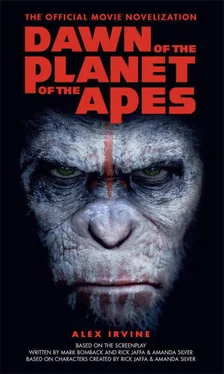The one-eyed ape turned and snarled at the tank as it fired again. This time the shell plowed up a huge section of pavement between the skeleton of the trolley car and the burning hulk of the pickup. Apes and pieces of apes tumbled through the air. The cheering on the human side got louder, and Dreyfus was right with them.
“Yeeeahhhh!” he screamed. “Let’s go, let’s go! Hit these bastards, now!”
Rifle and grenade fire from the parapet and the defensive bulwarks focused on the apes coming over the wires. They got a lot of them, but more and more kept coming. As soon as the tank got into position in front of the Colony gate, its .50-caliber would keep the apes off practically all by itself.
Dreyfus heard another crackle and the tank operator’s voice blared out on the parapet.
“Bet our monkey pals wish they hadn’t missed us out at the point,” the man said, cool as could be. Dreyfus smiled.
Out in the street, One-Eye wheeled his horse around and charged at the tank. The .50-cal gunner was keeping his fire concentrated across the front of the defensive positions, making it harder for the apes to get close. He caught sight of One-Eye coming his way and tried to drop the .50’s barrel down, but One-Eye blasted away at the turret and the gunner flinched down behind the shield. That gave One-Eye the moment of extra time he needed.
His gun clicked empty and he threw it away at the same moment as he threw himself off his horse, hurtling toward the gunner feet first. He hit the tank turret with one foot and gripped the gunner’s neck with the other. The barrel of the .50-cal swung up and out, stitching a line of holes up across the facade of the Colony. One-Eye flung the gunner off the tank. Apes descended upon him almost before he hit the pavement.
They started to run parallel with the tank, watching One-Eye as he leered down into the hatch, and when he dropped down into the tank they leapt onto it and screeched, pounding their fists and the butts of their rifles on its armor.
From the radio room feed came Finney’s voice.
“Boss?” In the background Dreyfus could hear screams.
“I know,” Dreyfus said.
The tank lurched and turned, slowing down some but rolling steadily forward.
“Boss?” This time it was the sniper just to his right. He was pointing down to the tank, which crossed the street and angled straight toward the defensive emplacement in front of the Colony gate.
“I know,” Dreyfus said again.
The tank crushed the outer part of the breastworks, ground its tracks against the Jersey barriers, and pushed over them, as well. The defenders scattered and the apes, adopting tactics used by soldiers since the invention of the tank during World War I, sheltered behind it. It rattled and bounced up the stairs and drove straight into the pillars dividing the Colony gate in thirds. Its engine roared and with a rolling boom, the columns collapsed into the Colony gate.
It held. For longer than Dreyfus would have thought, it held.
Then it collapsed inward and the apes poured through the breach into the Colony.
The parapet sagged, and part of it collapsed, spilling the defenders down into the rubble and the throng of apes. Outside, no organized defense remained. The apes owned the street. The tank stalled against the pile of rubble, and One-Eye climbed part of the way out, savoring the damage he had done. Then he realized the full extent of it, and a savage light seemed to shine in his empty eye.
Dreyfus, looking down at him, realized he had a perfect shot. He brought up the barrel of his gun, and at the moment of truth a group of fleeing humans rushed through his field of vision.
“Dammit,” he growled, and held the rifle pointed at One-Eye. “Move,” he said. “One of you, human, ape, I don’t care. Just give me one… clear…”
“Dreyfus!” Finney screamed. “Let’s go!”
There were too many people around. Dreyfus knew that, viewed from the distance of history, a dead bystander would be deemed a good trade-off for a dead One-Eye. But this was not history. This was life, right now, and he could not bring himself to pull the trigger.
So he ran after Finney as more pieces of the parapet fell away underneath him. As he started to retreat, he saw apes climbing up the ruined gate. It was time to split up, guerrilla-style, and figure out how to fight. The irony of the term did not escape him.
The tank , he thought. Who would have figured it would show up, and lose us the goddamn battle.
Finney started climbing—well, mostly sliding—down an angled piece of one of the Colony gate’s pillars. It sloped away from the main market area, which was a sea of hand-to-hand fighting. Absolute carnage, worse than anything Dreyfus had ever seen. He blotted it out, not because he thought he was above it, but because his people needed him to think. How the hell was he going to do that while seeing the beginnings of a slaughter? What he had to do was get out of there, bring as many of the Colony citizens as he could with them, and then turn the tables on the goddamn apes if it took a year, or ten years, or twenty to make it happen.
“Boss! Boss!” Werner’s voice was screaming from the radio room feed. Dreyfus didn’t have time to listen. He concentrated on the column, on getting down it without dumping himself into the midst of a sea of bloodthirsty apes. He couldn’t tell if Werner was excited about something, or being dismembered by a pair of gorillas.
He made it down the column, putting his hands and feet exactly where Finny had. Then, from the scaffolding, they hopped across into the main building. Shortly after that, as they climbed down a steel ladder into the depths of the building’s unfinished sub-basements, they got one more surprise.
Werner was down there.
“I grabbed the portable set and got the hell out of the radio room,” he said before Dreyfus could ask. “There was fighting right outside the door, but I pushed through the back wall.”
This was one of the virtues of living in a place where every dwelling was at least partly assembled out of scrap plywood, Dreyfus thought.
“But that’s not the reason I brought the portable,” Werner went on. Dreyfus looked at him. It irritated him when people said things, and then waited for you to ask obvious questions.
“What?” he snapped.
“This little guy has a recorder,” Werner said, patting the transceiver hanging against his hip. “And I’ve got some sound for you, boss. I think you’ll be glad to hear it.”
“First we get the hell out of here,” Finney said. He led them further down into the sub-basement. The apes would look up first—Dreyfus was counting on it. They weren’t naturally drawn to dark or confined spaces. If he could avoid capture—or worse—for a little while, they might have a chance to figure out what to do next.
Dreyfus began to realize how exhausted he was. He needed to sleep. They all needed to sleep. So they picked a spot far into the corner of the deepest sub-basement, where a steel door opened—according to Finney—into an old Bay Area Rapid Transit maintenance tunnel.
“Couple hours of shuteye, and then we go into the tunnels,” Finney said. “See if anyone else had the same idea. There are other ways to get in.” Going underground, Dreyfus thought. It was bound to happen. He’d done just about everything else.
“Wait. First I want to hear what you got,” Dreyfus said to Werner.
“Thought you’d never ask,” Werner replied. He touched a button on the portable rig and rewound the digital recording a minute or so. When he hit play, the first thing that came out was his own voice, loud and strident.
“Jesus, turn that down,” Dreyfus said.
Читать дальше












